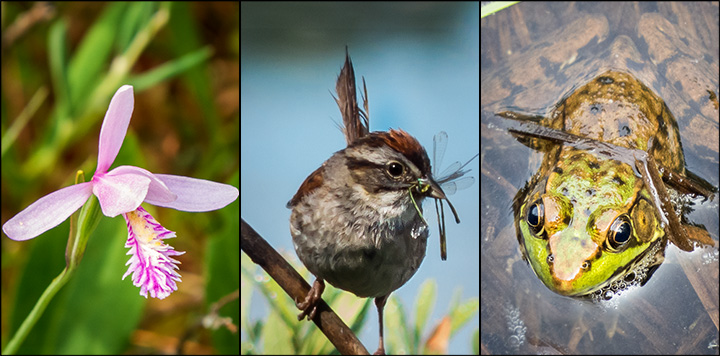EPA Citizen Scientist Wetland Monitoring Project:
Citizen Science Training Workshop I – Observing Frogs, Birds, and Plants
Saturday, 28 February 2015
Saturday, 21 March 2015
2:00 - 5:00 PM
 Adirondack Wetlands: Rose Pogonia on Barnum Bog, Swamp Sparrow on Heron Marsh, Green Frog on Heron Marsh
Adirondack Wetlands: Rose Pogonia on Barnum Bog, Swamp Sparrow on Heron Marsh, Green Frog on Heron Marsh
Join the Wetland Detective Monitoring Corps! These workshops will give you the opportunity to learn more about the natural world while also helping protect it. Become a citizen scientist and learn how to collect information on plants, birds, and amphibians in Adirondack boreal wetland ecosystems. Come to one of the February and March training workshops:
- You will get a brief overview of the project, boreal wetlands, and phenology – the study of biological timing and cycles.
- Next, participate in three interactive modules that will teach you how to identify target amphibian, bird, and plant species by sight and sound, by listening to frog and bird calls and examining wetland plant leaves and flowers.
- You will also learn how to record observations of these animals and plants.
Attending one workshop in February or March will prepare you for the spring workshop on 30 May, when you will put these observational skills to use in a guided outdoor visit to a wetland site.
To sign up, please RSVP to Kristin Pasquino and mention which workshop you will attend (phone: 518-582-2000 x12; email: aic@esf.edu). No prior citizen science experience is necessary. Bring a friend! These workshops are open to the public and designed for participants over the age of 15. Please check out the EPA Citizen Scientist Wetland Monitoring Project website for more information and updates.
Both training sessions are free. You can download a copy of the Citizen Scientist Handbook, by clicking here. For more information and to sign up for the training workshop, contact:
Kristin Pasquino
Adirondack Interpretive Center
SUNY College of Environmental Science and Forestry
6312 Route 28N, Newcomb, NY 12852
Phone: 518-582-2000 Email: aic@esf.edu
Wetland Monitoring Project Target Species
The project focuses on the following peatland plant species:
| Balsam fir (Abies balsamea) | Bog laurel (Kalmia polifolia) |
| Black spruce (Picea mariana) | Bog rosemary (Andromeda polifolia) |
| Few-seeded sedge (Carex oligosperma) | Labrador tea (Rhododendron groelandicum) |
| Leatherleaf (Chamaedaphne calyculata) | Pitcher-plant (Sarracenia purpurea) |
| Rose pogonia (Pogonia ophioglossoides) | Sheep-laurel (Kalmia angustifolia) |
| Small cranberry (Vaccinium oxycoccos) | Tamarack/Larch (Larix laricina) |
Project participants will track the following bird species:
Project participants will monitor the following amphibians:
| American Bullfrog (Lithobates catesbeianus) | American Toad (Anaxyrus americanus) |
| Green Frog (Lithobates clamitans) | Gray Tree Frog (Hyla versicolor) |
| Mink Frog (Lithobates septentrionalis) | Northern Leopard Frog (Lithobates pipiens) |
| Pickerel Frog (Lithobates palustris) | Spring Peeper (Pseudacris crucifer) |
| Western Chorus Frog (Pseudacris triseriata) | Wood Frog (Lithobates sylvaticus) |
